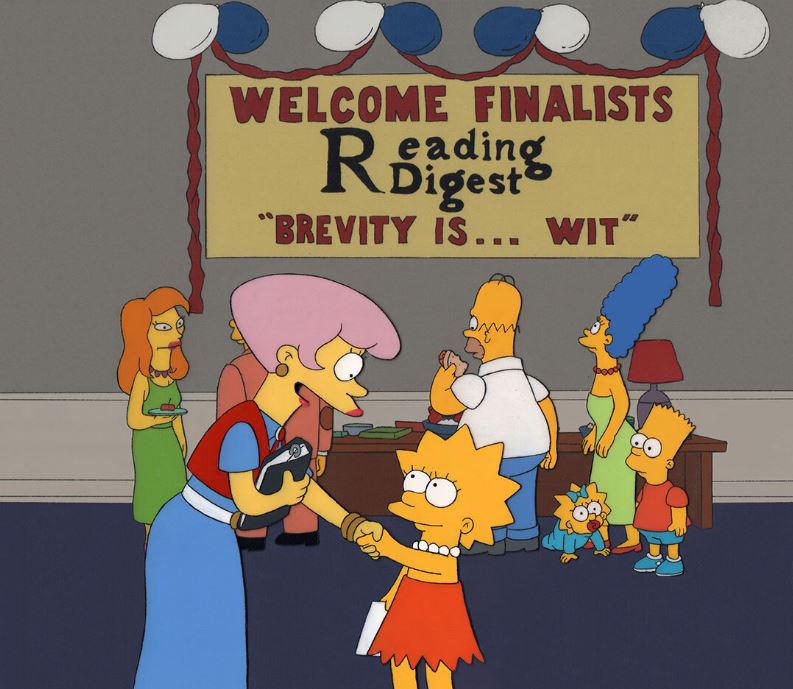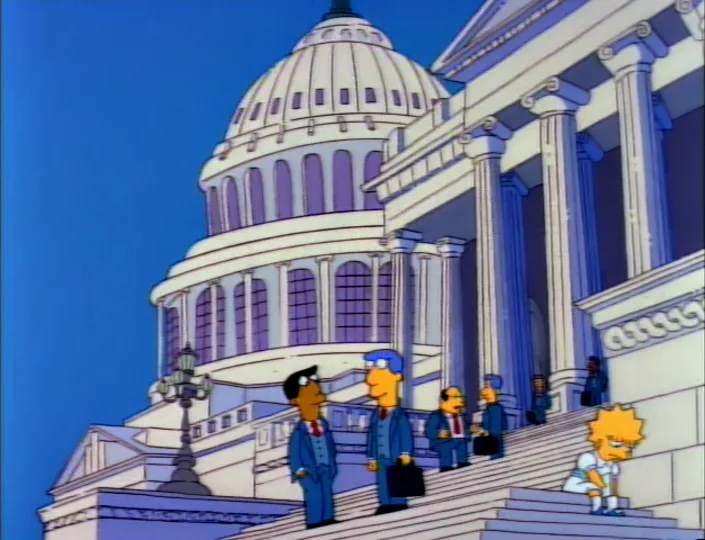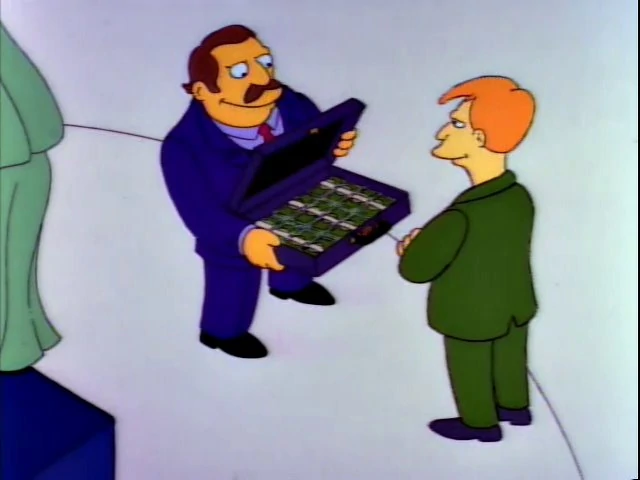It was one of the first episodes of season 3, titled “Mr. Lisa Goes to Washington,” a reference to the classic 1939 movie Mr. Smith Goes to Washington. Lisa wins a patriotic essay contest advertised in a Reader’s Digest magazine Homer’s obsessed with that gets her and the family a free trip to Washington, DC. The prompt for the writing is “What makes America great.”
The essay comes to her when she goes out into the wilderness one day and sees an American bald eagle land on a tree branch close to her. Lisa’s trip to Washington starts out well, but then her idealistic dreams get shattered when she witnesses a congressman accepting a bribe from a logger that wants to cut down trees in a national preserve. And then, Lisa goes on the attack.
When The Simpsons are at their best, this is the type of episode they produce. “Mr. Lisa Goes to Washington” (which aired on September 26, 1991) is a timely reminder of how powerful good old-fashioned satire can be, and also of how well The Simpsons used to do it. It excels in keeping things simple for its metaphors to come through, something that only got stronger as subsequent seasons came and went.
What made this particular episode special, though, was its ability to refrain from partisanship while making its commentary on how Americans conduct politics. It’s something that, by and large, the cartoon series has managed to admirably pull off since its inception: point and laugh at America and everything and everyone in it.
As stated above, the episode focuses on Lisa’s first-hand experience with America’s political culture and how it mostly boils down to scratching someone’s back just enough to get one’s own back scratched in return. The Washington, D.C., trip starts with a few stops on popular landmarks like the IRS, which Homer boos at, and the Watergate building (famous for the Nixon administration’s coverup of the break-in that took place there, at Democratic HQ). The Simpsons get a tour of the White House, too, eventually walking in on Barbara Bush as she’s taking a bubble bath in one of the bathrooms, which forces the first lady to act as tour guide while in the tub.
This part of the episode puts the audience firmly in the early 1990s, when George H.W. Bush was in power and the country was still processing the Reagan years and all the trickling down the economy was supposed to be doing but wasn’t (Reaganomics in action, so to speak). It was a time when the ultra-patriotic fervor of the ’80s was dwindling given how Reagan’s tax cuts impacted government spending on essential programs all while the handling of the AIDS epidemic and the Iran-Contra scandal eroded public trust in federal institutions.
The Simpsons consider this political landscape from the point of view of a family that lives within modest means and is somewhat detached from the more ‘insider politics’ aspects of civic responsibility. Homer, Marge, and Bart are often portrayed as a gullible bunch that learn their lessons only after being duped by the system. Lisa is the exact opposite, the voice of reason in a place that’s always one pitchfork away from becoming an angry mob.
The Simpsons’ signature satire hits hard early, especially during a sequence in which several kids present their essays to see if they win the trip to the nation’s capital. One contestant wrote his essay on a special kind of American citizen. He reads “My back is spineless. My belly is yellow. I am the American nonvoter.” Others refer to freedom as a wholly American recipe with cups of checks liberally sprinkled on batches of balances or set amounts of liberty mixed in with a few tablespoons of justice. It’s a brand of American exceptionalism that people wish doesn’t get spoiled for young kids before adulthood.
Lisa falls into all of it in her essay, writing that “[in 1776] the trees in Springfield Forest were tiny saplings, trembling towards the sun. And as they were nourished by Mother Earth, so too did our fledgling nation find strength. Who would have thought such mighty oaks or such a powerful nation could grow out of something so fragile, so pure?” Of course, idealizations such as these only hold their own so long as reality doesn’t rear its party-pooping head. The Simpsons is that party pooper, but the fact it masks this reality through comedy makes it an easier pill to swallow.
Once Lisa sees the congressman receiving a bribe, her essay changes its tone entirely to one of disillusionment and disappointment. She pens a new essay titled “Cesspool on the Potomac,” and she goes on to declare that the actions of the corrupt congressman show that Washington is still as swampy as it was when it was first built. Government officials lose their collective minds after hearing Lisa’s essay read aloud. One runs to phone to tell another one of the unfolding crisis, screaming into the phone “A little girl is losing faith in democracy!” (“Good Lord!” rings out from the other end of the line).
It’s important that it’s Lisa who sees the government’s moral compass pointing in the wrong direction. Her being a kid colors things differently, helping the show argue that even a kid can tell when things aren’t working the way they should. The Simpsons get their messages across swiftly thanks to this approach. The iconic cartoon family is a parody of everyday Americans, but it’s a parody that doesn’t paint them as hopeless causes. It makes it a point to remind people that they’re capable of reaching sensible conclusions once all the cards are on the table.
Hope is built into the citizens of Springfield. Homer at his dumbest still reaches the more reasonable conclusion by the end of any given episode, even if it results in Bart getting choked for it a little bit. Things remain dysfunctional but ultimately more approachable after a couple of d’ohs. The Simpsons always learn, even if it means relearning the same thing over and over again.
In “Mr. Lisa Goes to Washington,” the triangle-haired Simpson essentially asks people to avert their eyes from the blinding lights of patriotism to able to criticize all the bad things that government does and has become. It’s not about tearing down institutions but about keeping a watchful eye on them. Lisa’s frustrations in other episodes stem from her disbelief that things such as these just don’t register as common sense. The Simpsons take this part of the social fabric and create some of the best satire in television in the hopes people might rethink certain things for the better.
Lisa does end up losing her faith in democracy, although its more a loss of faith in the system rather than the idea, but the episode still finds a way to put a comforting hand on the viewers’ shoulders to let them know it’s okay for that to happen. It tells people that thinking our government is perfect and that speaking out on it is a sign things aren’t going so well for America are two of the kinds of ideas we definitely shouldn’t entertain.
In the end, Lisa is simply asking audiences to consider doing one thing: to stand up against the bad and to ask more of those institutions that are supposed to have our backs in this country. In today’s political climate, it’s a message that bears repeating.












